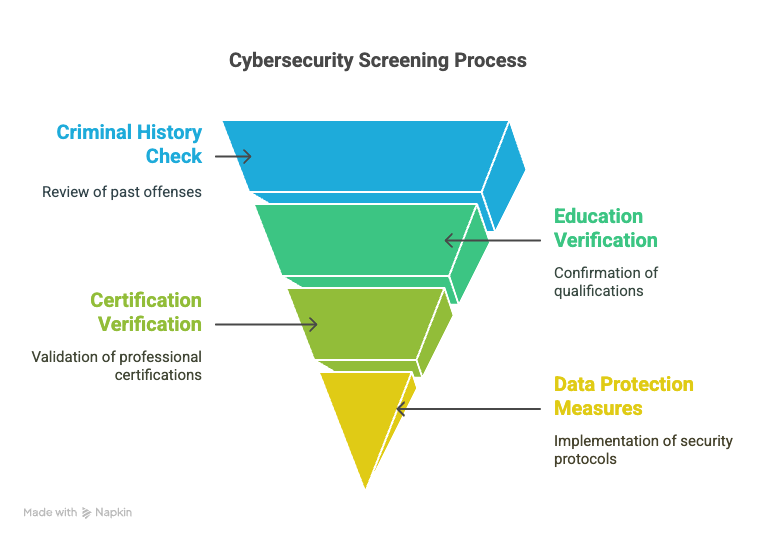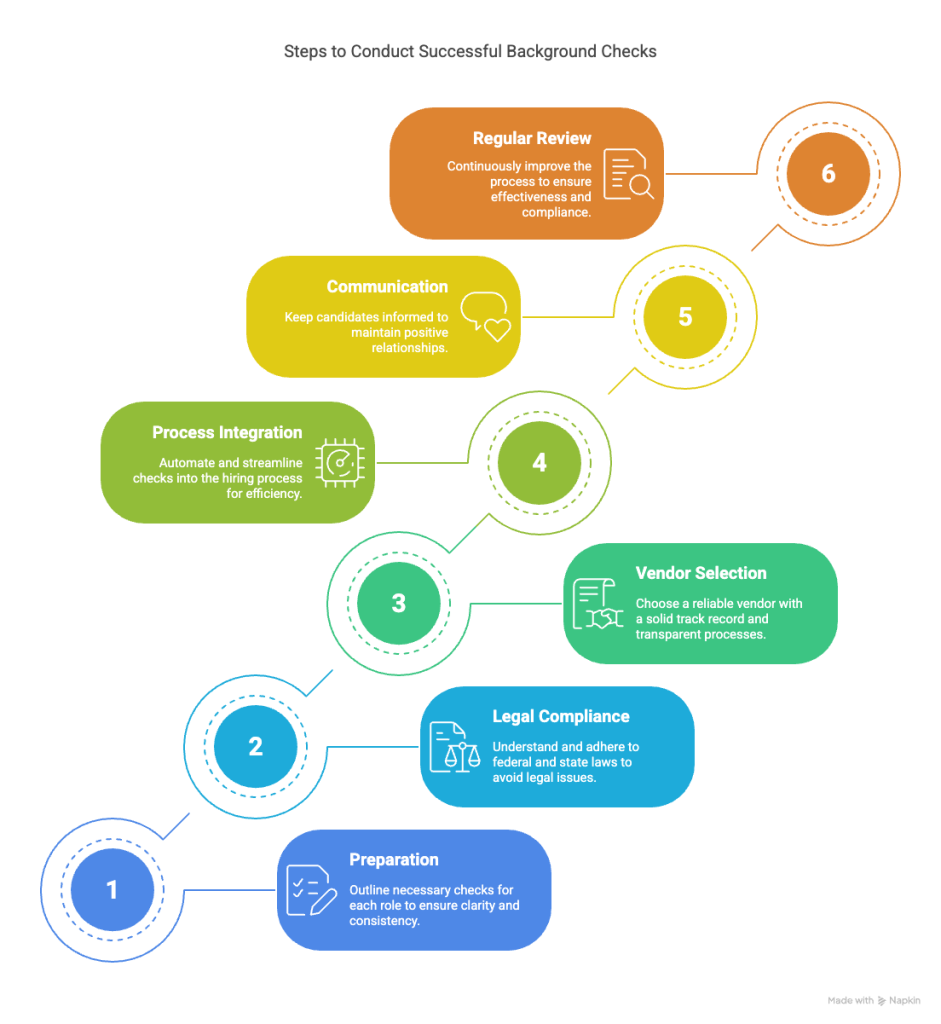The tech industry in North Carolina is booming, attracting startups and tech giants alike to tap into its rich pool of talent and innovative spirit. However, as the industry grows, so does the need for rigorous background checks, especially in sensitive areas like cybersecurity. This comprehensive guide aims to explore the intricacies of background checks in the North Carolina tech industry, focusing on startups and cybersecurity roles.
Key Takeaways
- North Carolina's booming tech sector underscores the critical need for thorough background checks, especially in sensitive roles like cybersecurity to protect sensitive data.
- Legal compliance with federal and state laws, such as the Fair Credit Reporting Act, is essential to avoid costly mistakes during the hiring process.
- Startups can effectively implement background checks by leveraging automated services and being transparent with candidates to align with legal standards without hampering growth.
- For cybersecurity roles, verifying criminal history, education, and certifications is crucial to ensure candidates possess the necessary expertise and protect company data.
- Comprehensive background checks not only mitigate potential risks but also build trust within the workforce, enhancing long-term company success and stability.
Introduction
North Carolina's tech sector is experiencing significant growth, drawing startups and established tech companies alike. As this industry expands, the importance of conducting thorough background checks becomes more pronounced, especially in sensitive areas like cybersecurity. For tech startups, balancing a dynamic work culture with the need for security can be challenging. Cybersecurity roles, in particular, demand stringent checks due to the high stakes involved in protecting sensitive data.
Background checks serve as a vital tool in safeguarding a company's interests and ensuring a reliable workforce. They encompass various types of screenings, from verifying criminal history to confirming educational credentials. In the context of North Carolina's tech scene, these checks not only comply with legal obligations but also support the unique demands of tech startups and cybersecurity roles.
With this guide, you'll explore the specific needs and challenges of implementing effective background checks in North Carolina's tech industry. Whether you're part of a startup or managing cybersecurity roles, understanding these intricacies can make a significant difference in your hiring process. Are your current background check procedures ready to meet the challenge? Let's find out.
Understanding North Carolina Tech Industry Background Checks
Background checks are crucial tools in the hiring process, providing employers with essential information about potential employees. They examine a candidate's history, including criminal records, employment history, and education. In North Carolina's tech industry, these checks ensure the right fit for roles sensitive in nature, like cybersecurity, where trust and integrity are paramount.
Federal and state laws regulate these checks. The Fair Credit Reporting Act (FCRA) sets national standards, while North Carolina has specific statutes limiting the use of certain records. You must stay informed about these legalities to avoid costly mistakes and ensure compliance. Missteps here can lead to discrimination claims or legal action.
The tech sector has unique screening needs. High demand for specialized skills means tech companies in North Carolina prioritize checking technical certifications and professional credentials. Reference the EEOC Guidelines on Background Checks to align your practices with federal anti-discrimination laws. Consider how these screenings impact potential hires and weigh their importance against rapid hiring demands.
Do you have a comprehensive process that balances the urgency of hiring with the thoroughness that roles in technology demand? A well-structured background check minimizes risk and fosters a safe, compliant workplace. Start by familiarizing yourself with the basic legal requirements, then assess how your company's needs fit within that legal framework. How prepared are you to handle this delicate task?
Startups and Background Checks in NC
Startups need background checks to ensure both flexibility and security. These young companies face unique challenges. They must hire quickly to scale, but without compromising safety or compliance. It's a delicate balance. You want to move fast, but not so fast that you overlook crucial screening processes.
Startups in North Carolina must comply with both federal and state laws, despite their limited resources. Ignoring these regulations can lead to significant penalties. For instance, conducting a thorough check without violating the Fair Credit Reporting Act (FCRA) requires careful attention. Fines for breaching these laws can be steep and detrimental to a growing business.
But how do you maintain compliance without stifling your growth? Start by integrating smart hiring practices. Use technology to streamline the process. Many platforms offer automated services tailored for startups. These services often include a streamlined process for obtaining candidate consent and ensuring data accuracy, helping you stay aligned with legal requirements.
Adopt best practices such as setting clear guidelines for your checks. Determine what checks are essential for your roles. For example, a tech startup may prioritize criminal and employment history over credit checks, unless it's a financial role. You don't have to do each check manually; third-party providers can handle most of it cost-effectively.
Finally, foster an open culture about the need for background checks. Be transparent with your candidates. Explain why these checks are integral to securing your company's future. This openness not only builds trust but also ensures that candidates are aware of the company's commitment to safety and integrity.
Cybersecurity Roles and NC Cybersecurity Screening
Thorough background checks are crucial in cybersecurity roles. When you're responsible for protecting sensitive data, the stakes are high. If you make a mistake, the fallout could be severe, affecting not just your company but potentially millions of people.
When conducting cybersecurity background checks, focus on a few key areas. Criminal history is at the top of the list; check for past offenses that could indicate a risk or potential vulnerability. Education verification is also critical. Misrepresentation of qualifications is more common than you might think, and you want to be sure your team members have the claimed expertise. Professional certifications like CISSP or CISM should also be verified to ensure candidates possess the necessary skills for the job.

One challenge you might face is handling the sensitive information these checks require. It's vital to have protocols in place to protect both your company's data and the privacy of potential employees. Consider encrypting data and limiting access to it strictly on a need-to-know basis.
For screening standards in North Carolina, follow established protocols that align with industry best practices. This might include aligning with NIST guidelines or other cybersecurity frameworks relevant to your industry. Rest assured, implementing these standards helps build a workforce capable of facing today's cybersecurity threats head-on.
Without cutting corners, these checks provide a robust view of candidates, helping you make informed hiring decisions. Do you have the right safeguards in place for your cybersecurity screenings? If not, you may need to step up your game to ensure your company's resilience.
Conducting Background Checks: Step-by-Step Guide
A successful background check starts with proper preparation. Begin by outlining the specific checks necessary for each role. For tech positions, these might include criminal history, education verification, and employment history. Clearly define what constitutes disqualification for your company. This ensures transparency and consistency.
Next, you'll need to navigate legal considerations. Familiarize yourself with both federal and state laws that apply to background checks. In North Carolina, this includes adhering to the Fair Credit Reporting Act (FCRA) which mandates obtaining written consent from candidates before initiating checks. Missteps here can lead to costly legal issues, so diligence is crucial.
When it comes to vendor selection, choose a partner that aligns with your needs. Look for vendors with a solid track record, good reviews, and comprehensive service offerings. Make sure they comply with legal standards and are transparent about their processes and pricing. This way, you are left to focus on core business functions.

Integrate these checks smoothly into your hiring process. Automate where possible to reduce manual efforts and ensure prompt follow-ups on any red flags. Communication is key: keep candidates informed throughout to maintain a positive relationship. Lastly, review your process regularly for improvements. A meticulous, yet pragmatic approach ensures you're bringing the right people into your company while protecting your organization.
Balancing Privacy with Security Needs
Employee privacy concerns are front and center during background checks. You want to know everything about a candidate to protect your business, but you need to respect their privacy. How do you find that balance? Start by being transparent. Tell your candidates what information you will collect and why. This clarity can ease their concerns.
Confidentiality is the cornerstone of any background check process. The data you gather is sensitive. Think about how you'd want your information handled if roles were reversed. Work with vendors committed to data security. Ensure they employ encryption and have robust access controls.
Maintaining ethical standards is non-negotiable. Your screening process should be fair and unbiased. Apply the same criteria uniformly to all candidates. Regular audits of your process ensure you're on the right track. Keep communication open and honest with those you screen. This approach can foster trust and reduce fears of overreach.
Balancing privacy and security isn't just about compliance; it's about building trust. When employees see fairness and transparency, they're more likely to commit to your company for the long haul.
Benefits of Comprehensive Background Checks
Comprehensive background checks are a strategic necessity for any tech firm, especially within startups and cybersecurity roles. They go beyond mere formalities â they are your first line of defense against potential risks.
Risk Mitigation: A thorough background check can save your company from countless headaches down the line. It helps identify red flags that could indicate potential legal issues or reputational harm. For example, discovering discrepancies in a candidate's employment history could save you from potential fraud. Do you want to risk hiring someone with a fraudulent record into your cybersecurity team?
Building Trust: Employees are more confident knowing their colleagues have undergone rigorous screening. This trust fosters a secure work environment and enhances team collaboration. A transparent process reassures your team that you've hired qualified and trustworthy individuals.
Long-Term Value: A solid background check process doesnât just defend against immediate threats; it also contributes to your company's long-term success. By ensuring you're hiring the right people, you support a stable and efficient workplace. This preventive measure helps maintain productivity and reduces turnover, which is critical for growthâparticularly in fast-evolving tech environments like those in North Carolina.
Think of background checks as an investment in your company's future, reducing unforeseen issues and maintaining a committed team for years to come. How does your current process measure up to these standards?
Conclusion
Thorough screening also pays dividends in the long run. It saves you from the costly process of rehiring and retraining, which can dampen team morale and disrupt business flow. In a tech company, where the roles are highly specialized, finding the right person the first time enhances your operational effectiveness and keeps your projects on track.
By integrating effective screening processes, you lay a foundation for long-term success and sustainability. Companies with rigorous background check procedures tend to have lower turnover rates and better reputations in the industry. So, ask yourself, can you afford not to invest in comprehensive background checks?
Frequently Asked Questions (FAQs)
Do NC startups require background checks?
Yes, many North Carolina startups conduct background checks to ensure the integrity and reliability of potential employees. This often includes checking criminal history, education, and employment verification.
How to verify IT certifications in NC?
You can verify IT certifications by contacting the issuing organization directly. Many institutions, like CompTIA or Microsoft, offer online verification tools.
Can non-compete agreements affect NC tech hiring?
Yes, non-compete agreements can impact hiring as they may limit where an individual can work after leaving an employer. Itâs important to review these agreements carefully in North Carolina.
Are expunged records visible to NC tech employers?
No, expunged records are not visible to employers. Once a record is expunged in North Carolina, it should not appear in a background check.
Do NC cybersecurity roles require federal clearances?
Some roles may require federal clearances, especially if they involve working with government contracts. Check the specific job requirements.
How to handle international education verification in NC?
Verify international education by using third-party services like World Education Services (WES), which provide evaluations that translate foreign credentials to U.S. equivalents.
Can a misdemeanor affect tech employment in NC?
Yes, a misdemeanor can affect employment, depending on the nature of the crime and the employerâs hiring policies. Honesty about past offenses is advisable.
Whatâs the cost of tech background checks in NC?
Costs vary, but basic checks range from $30 to $100. Comprehensive checks, including credit reports or international searches, may cost more.
Do NC tech companies check social media?
Many companies do check social media as part of their hiring process. Itâs wise to maintain a professional online presence.
How to screen for remote tech workers in NC?
Use virtual interview tools, conduct technical assessments, and verify references to effectively screen remote candidates.
Do NC tech contractors require a separate background check?
Yes, contractors often undergo background checks similar to full-time employees. This ensures they meet the companyâs standards.
What is the NC stance on credit checks for tech jobs?
Employers in NC may conduct credit checks, but they must comply with the Fair Credit Reporting Act. Candidates must consent to this check.
Is drug testing common for tech roles in NC?
Yes, many tech companies in North Carolina include drug testing in their hiring process. Itâs part of ensuring a safe and productive workplace.
Can freelance tech workers in NC face different checks?
Freelancers might face fewer checks, but clients can still request background verifications, especially for long-term projects.
Definitions
Background Check
A background check is a process employers use to verify a candidateâs identity, history, and qualifications. It typically includes criminal records, employment history, education, and references. You might also check professional licenses or certifications, especially for specialized roles like cybersecurity. Make sure you meet legal requirements, such as getting written consent under the Fair Credit Reporting Act (FCRA). Doing it right helps reduce hiring risks.
Fair Credit Reporting Act (FCRA)
The FCRA is a federal law that governs how employers conduct background checks using third-party services. It requires you to get written permission from the job applicant before obtaining their report. You must also share the results with the candidate if you use the information to make a negative hiring decision. Noncompliance can lead to lawsuits and fines. Donât skip these stepsâthey protect both your business and the candidate.
Employment History
Employment history highlights a candidateâs previous work experience, including job titles, duties, dates of employment, and reasons for leaving. Verifying this helps you confirm someone's qualifications and spot inconsistencies. For tech roles, accurate work experience often ties directly to job readiness. Did the candidate actually lead that cloud security project? A verification check can tell you.
Professional Certifications
Professional certifications, such as CISSP (Certified Information Systems Security Professional) or CISM (Certified Information Security Manager), validate a candidateâs technical knowledge and skills. For cybersecurity roles, confirming these credentials is more than a formalityâitâs a necessity. Would you trust someone to protect your systems if their credentials donât hold up? Always confirm licensing through the issuing body.
Candidate Consent
Candidate consent is written approval you must obtain before starting a background check. Under laws like the FCRA, this step is mandatory. Failing to get clear consent can create legal problems and erode trust. Make your process straightforward. Explain what youâre checking and why. Transparency builds confidence and keeps you legally compliant.
References
- NC TECH State of the Technology Industry Report 2025
- Business NC: Tech Jobs Poised to Climb
- WilmingtonBiz Tech Snapshot
- CaldwellEDC: Tech Jobs Growth

GCheck Editorial Team
Meet the GCheck Editorial Team, your trusted source for insightful and up-to-date information in the world of employment background checks. Committed to delivering the latest trends, best practices, and industry insights, our team is dedicated to keeping you informed.
With a passion for ensuring accuracy, compliance, and efficiency in background screening, we are your go-to experts in the field. Stay tuned for our comprehensive articles, guides, and analysis, designed to empower businesses and individuals with the knowledge they need to make informed decisions.
At GCheck, we're here to guide you through the complexities of background checks, every step of the way.





